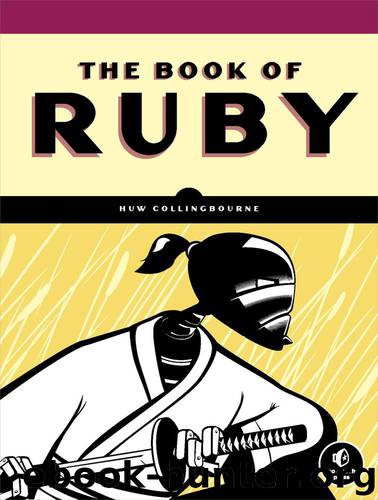The Book of Ruby

Author:Collingbourne, Huw [Huw Collingbourne]
Language: eng
Format: epub
Tags: COMPUTERS / Programming Languages / Ruby
ISBN: 9781593274009
Publisher: No Starch Press
Published: 2011-06-29T16:00:00+00:00
Note
In Ruby 1.9, the instance_variables method returns an array of symbols. In Ruby 1.8, it returns an array of strings.
Name Conflicts
Module methods (those methods specifically preceded by the module name) can help protect your code from accidental name conflicts. However, no such protection is given by instance methods within modules. Let’s suppose you have two modules—one called Happy and the other called Sad. They each contain a module method called mood and an instance method called expression.
happy_sad.rb
module Happy def Happy.mood # module method return "happy" end def expression # instance method return "smiling" end end module Sad def Sad.mood # module method return "sad" end def expression # instance method return "frowning" end end
Now a class, Person, includes both these modules:
class Person include Happy include Sad attr_accessor :mood def initialize @mood = Happy.mood end end
The initialize method of the Person class needs to set the value of its @mood variable using the mood method from one of the included modules. The fact that they both have a mood method is no problem; being a module method, mood must be preceded by the module name so Happy.mood won’t be confused with Sad.mood.
But both the Happy and Sad modules also contain a method called expression. This is an instance method, and when both the modules are included in the Person class, the expression method can be called without any qualification:
p1 = Person.new puts(p1.expression)
Which expression method is object p1 using here? It turns out that it uses the method last defined. In the example case, that happens to be the method defined in the Sad module for the simple reason that Sad is included after Happy. So, p1.expression returns “frowning.” If you change the order of inclusion so that Happy is included after Sad, the p1 object will use the version of the expression method defined in the Happy module and will display “smiling.”
Before getting carried away with the possibilities of creating big, complex modules and mixing them into your classes on a regular basis, bear this potential problem in mind: Included instance methods with the same name will “overwrite” one another. The problem may be obvious to spot in my little program here. But it may not be so obvious in a huge application!
Download
This site does not store any files on its server. We only index and link to content provided by other sites. Please contact the content providers to delete copyright contents if any and email us, we'll remove relevant links or contents immediately.
The Book of Ruby(677)
Computer Science Programming Basics with Ruby(439)
Programming Ruby: The Pragmatic Programmers' Guide(426)
Wicked Cool Ruby Scripts by Steve Pugh(390)
The Ruby Way: Solutions and Techniques in Ruby Programming (3rd Edition) (Addison-Wesley Professional Ruby Series)(346)
Computer Science Programming Basics with Ruby by Ophir Frieder Gideon Frieder and David Grossman(341)
Design Patterns in Ruby by Russ Olsen(287)
Learn Rails 5.2 by Stefan Wintermeyer(286)
The Rails™ 3 Way (John Magee's Library) by Obie Fernandez(255)
Docker for Rails Developers (for Den Patin) by Rob Isenberg(250)
Multitenancy with Rails by Ryan Bigg(234)
Ruby (Landry Series #1)(213)
